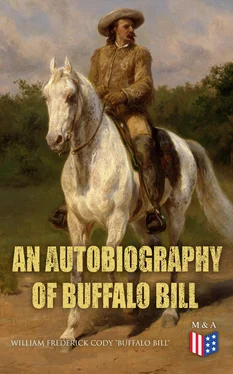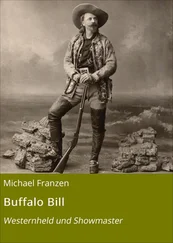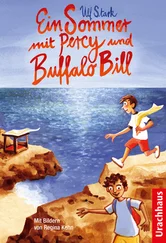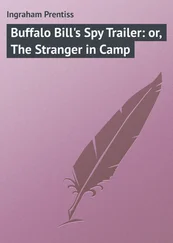The brilliant colors that had been smeared on his visage told me more forcibly than words could have done that his tribe was on the warpath. It was a decidedly unpleasant discovery for me.
While he was asking me in the Sioux language what I was doing there, and how many more were in the party, other braves began crowding through the door till the little dugout was packed as full of Sioux warriors as it could hold.
Outside I could hear the stamping of horses and the voices of more warriors. I made up my mind it was all over but the scalping.
And then a stately old brave worked his way through the crowd and came toward my bunk. It was plain from the deference accorded him by the others that he was a chief. And as soon as I set eyes on him I recognized him as old Rain-in-the-Face, whom I had often seen and talked with at Fort Laramie, and whose children taught me the Sioux language as we played about the wagon-beds together. Among these children was the son who succeeded to the name of Rain-in-the-Face, and who years later, it is asserted, killed General George A. Custer in the massacre of the Little Big Horn.
I showed the chief my broken leg, and asked him if he did not remember me. He replied that he did. I asked him if he intended to kill the boy who had been his children's playmate. He consulted with his warriors, who had begun busily to loot the cabin. After a long parley the old man told me that my life would be spared, but my gun and pistol and all my provisions would be regarded as the spoils of the war.
Vainly I pointed out that he might as well kill me as leave me without food or the means to defend myself against wolves. He said that his young men had granted a great deal in consenting to spare my life. As for food, he pointed to the carcass of a deer that hung from the wall.
The next morning they mounted their ponies and galloped away. I was glad enough to see them go. I knew that my life had hung by a thread while I had been their involuntary host. Only my friendship with the children of old Rain-in-the-Face had saved me.
But, even with the Indians gone, I was in a desperate situation. As they had taken all my matches I had to keep the fire going continuously. This meant that I could not sleep long at a time, the lack of rest soon began to tell on me. I would cut slices from the deer carcass with my knife, and holding it over the fire with a long stick, cook it, eating it without salt. Coffee I must do without altogether.
The second day after the departure of the Indians a great snow fell. The drifts blocked the doorway and covered the windows. It lay to a depth of several feet on the roof over my head. My woodpile was covered by the snow that drifted in and it was with great difficulty that I could get enough wood to keep my little fire going. And on that fire depended my life. Worse than all these troubles was the knowledge that the heavy snow would be sure to delay Harrington.
I would lie there, day after day, a prey to all sorts of dark imaginings. I fancied him killed by Indians on the trail, or snowbound and starving on the Plains. Each morning my notches on my calendar stick were made. Gradually their number grew till at last the twentieth was duly cut. But no Harrington came.
The wolves, smelling meat within, had now begun to gather round in increasing numbers. They made the night hideous with their howlings, and pawed and scratched and dug at the snow by the doorway, determined to come in and make a meal of everything the dugout contained, myself included.
How I endured it I do not know. But the Plains teach men and boys fortitude. Many and many a time as I lay there I resolved that if I should ever be spared to go back to my home and friends, the frontier should know me no more.
It was on the twenty-ninth day, as marked on stick, when I had about given up hope, that I heard a cheerful voice shouting "Whoa!" and recognized it as the voice of Harrington. A criminal on the scafford with the noose about his neck and the trap sagging underneath his feet could not have welcomed a pardon more eagerly than I welcomed my deliverance out of this torture-chamber.
I could make no effort to open the door for him. But I found voice to answer him when he cried "Hello, Billy!" and in response to his question assured him that I was all right. He soon cleared a passageway through the snow, and stood beside me.
"I never expected to see you alive again," he said; "I had a terrible trip. I didn't think I should ever get through—caught in the snowstorm and laid up for three days. The cattle wandered away and I came within an ace of losing them altogether. When I got started again the snow was so deep I couldn't make much headway."
"Well, you're here," I said, giving him a hug.
Harrington had made a trip few men could have made. He had risked his life to save mine. All alone he had brought a yoke of oxen over a country where the trails were all obscured and the blinding snow made every added mile more perilous.
I was still unable to walk, and he had to do all the work of packing up for the trip home. In a few days he had loaded the pelts on board the wagon, covered it with the wagon-sheet we had used in the dugout, and made me a comfortable bed inside. We had three hundred beaver and one hundred otter skins to show for our work. That meant a lot of money when we should get them to the settlements.
On the eighth day of the journey home we reached a ranch on the Republican River, where we rested for a couple of days. Then we went on to the ranch where Harrington had obtained his cattle and paid for the yoke with twenty-five beaver skins, the equivalent of a hundred dollars in money.
At the end of twenty days' travel we reached Salt Creek Valley, where I was welcomed by my mother and sisters as one returned from the dead.
So grateful was my mother to Harrington for what he had done for me that she insisted on his making his home with us. This he decided to do, and took charge of our farm. The next spring, this man, who had safely weathered the most perilous of journeys over the Plains, caught cold while setting out some trees and fell ill. We brought a doctor from Lawrence, and did everything in our power to save him, but in a week he died. The loss of a member of our own family could not have affected us more.
I was now in my fifteenth year and possessed of a growing appetite for adventure. A very few months had so dulled the memory of my sufferings in the dugout that I had forgotten all about my resolve to forsake the frontier forever. I looked about me for something new and still more exciting.
I was not long in finding it. In April, 1860, the firm of Russell, Majors & Waddell organized the wonderful "Pony Express," the most picturesque messenger-service that this country has ever seen. The route was from St. Joseph, Missouri, to Sacramento, California, a distance of two thousand miles, across the Plains, over a dreary stretch of sagebrush and alkali desert, and through two great mountain ranges.
The system was really a relay race against time. Stations were built at intervals averaging fifteen miles apart. A rider's route covered three stations, with an exchange of horses at each, so that he was expected at the beginning to cover close to forty-five miles—a good ride when one must average fifteen miles an hour.
The firm undertaking the enterprise had been busy for some time picking the best ponies to be had for money, and the lightest, most wiry and most experienced riders. This was a life that appealed to me, and I struck for a job. I was pretty young in years, but I had already earned a reputation for coming safe out of perilous adventures, and I was hired.
Naturally our equipment was the very lightest. The messages which we carried were written on the thinnest paper to be found. These we carried in a waterproof pouch, slung under our arms. We wore only such clothing as was absolutely necessary.
Читать дальше












